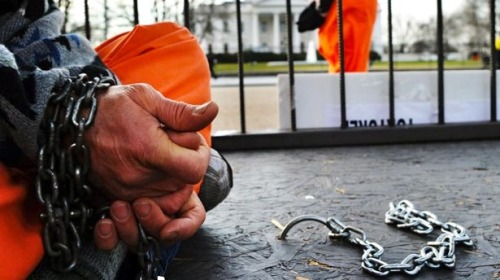The problem with NDAA 2012 is that it violates the Bill of Rights, specifically the right to Habeus Corpus (that you be charged before a judge, can call a lawyer and have a right to a speedy trial) and contradicts Posse Comitatus which prohibits the military operating on US soil against our citizens. The fact that 93 of 100 Senators voted in favor of it speaks volumes about their respect for the Constitution.
Obama Issues ‘Policy Directive’ Exempting American Citizens From Indefinite Detention
Paul Joseph Watson
Prison Planet.com
Wednesday, February 29, 2012
Despite the fact that it was his administration that specifically demanded the controversial ‘indefinite detention’ provisions of the NDAA be applied to Americans, President Obama has issued a ‘Presidential Policy Directive’ that forbids the law from being used against US citizens.

A “fact sheet” released by the White House last night contains details of a “Presidential Policy Directive” which explains that the administration will not seek to use the so-called ‘kidnapping provision’ of the National Defense Authorization Act to incarcerate American citizens without trial.
“Section 1022 does not apply to U.S. citizens, and the President has decided to waive its application to lawful permanent residents arrested in the United States,” states the White House fact sheet (PDF).
Obama’s PDD contains a number of other circumstances in which people would be exempt from indefinite detention, but the language concerning American citizens states that to be exempt, a US citizen must be “arrested in this country or arrested by a federal agency on the basis of conduct taking place in this country,” meaning Americans arrested abroad could still be kidnapped and held without trial.
The NDAA bill, which was signed into law by President Obama under the radar on New Years Eve while he was on vacation in Kailua, hands the federal government the power to “allow the military to indefinitely detain terror suspects, including American citizens arrested in the United States, without charge.”
There’s no doubt that this represents a victory for civil libertarians on both sides of the political spectrum, but skeptics will be keen to stress that just because the Obama administration, which could be out of office by this time next year, has indicated it will not indefinitely detain Americans under the NDAA, doesn’t necessarily mean that future administrations will also refrain from doing so.
Indeed, if the administration was so concerned about the indefinite detention provisions, why did it specifically lobby for them to be applied to American citizens in the first place?
- A d v e r t i s e m e n t
As we documented at the time, shortly before the bill was signed into law, Senator Carl Levin revealed that it was the administration which demanded the removal of language that would have protected Americans from the ‘kidnapping’ provisions of the NDAA.
“The language which precluded the application of Section 1031 to American citizens was in the bill that we originally approved…and the administration asked us to remove the language which says that U.S. citizens and lawful residents would not be subject to this section,” said Levin, Chairman of the Armed Services Committee.Don’t expect Obama’s PDD to be the end of the matter. Senators John McCain (Ariz.), Lindsey Graham (S.C.) and Kelly Ayotte (N.H.) have already indicated that they will argue against exempting American citizens from indefinite detention.
“Although we have not been able to fully examine all the details of these new regulations, they raise significant concerns that will require a hearing in the Senate Armed Services Committee,” they said in a joint statement. “We are particularly concerned that some of these regulations may contradict the intent of the detainee provisions of the National Defense Authorization Act passed by Congress last year.”
In issuing the policy directive, Obama is attempting to head off a potential states’ rights rebellion against the federal government. With Virginia already having passed a bill in the House and Senate that nullifies the indefinite detention provisions of the NDAA, Utah has introduced a resolution with the ultimate intention of doing the same, along with several other states.